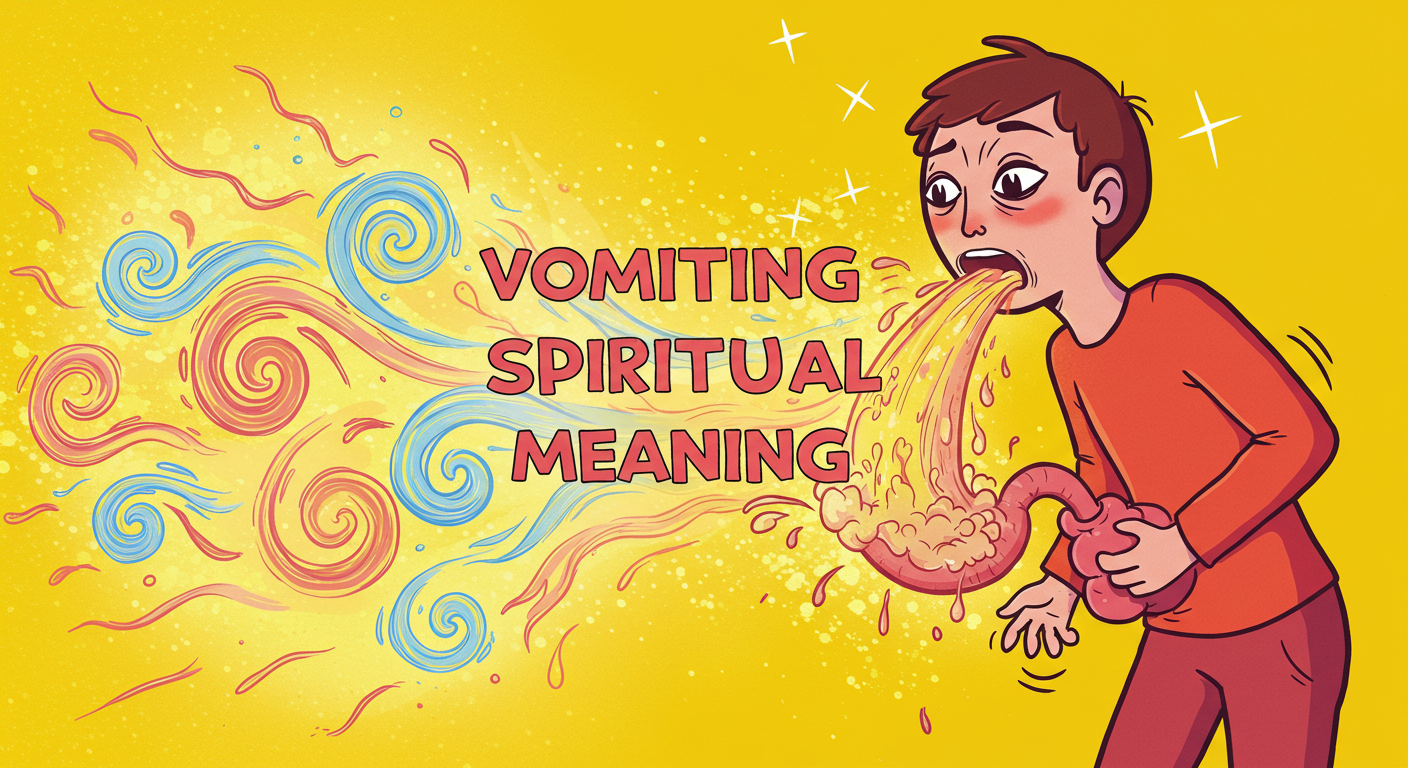Vomiting Spiritual Meaning – Symbolism & Cleansing Power!
Vomiting is generally experienced as a physical response to illness, food intolerance, or discomfort; however, in religious contexts, it carries deep symbolic meaning. Throughout cultures and religions, vomiting is frequently seen as an act of purging spiritual blockages, unresolved emotions, or negative energies.
Therefore, this article goes deeply into the spiritual meaning of vomiting, looking into its meanings within various belief systems, possible reasons, and how to practically apply its teachings into personal development. Through a complete analysis of this phenomenon, we hope to present a complete understanding of its significance in spiritual change.
Key Takeaways:
- Spiritually, vomiting symbolizes releasing negative energies, emotional burdens.
- Various traditions, such as shamanism, Hinduism, and Christianity, view vomiting as a sacred act of cleansing.
- Potential causes include overwhelming emotions, energetic shifts, karmic resolution, or empathic overload.
- Reflective practices, energy clearing, and self-care can support the integration of vomiting’s spiritual lessons for personal growth.
- Always balance spiritual interpretations with medical evaluation to ensure holistic well-being.
Symbolism of Vomiting in Spiritual Phenomena:
In spiritual systems, vomiting is elevated beyond its physical state and, as a result, is a potent metaphor for purification and rebirth. In particular, it is often linked with the removal of energies or emotions that block personal or spiritual advancement. For example, vomiting can be viewed as the body’s natural reaction to restore equilibrium, both physically and energetically and emotionally.

As the great spiritual teacher Eckhart Tolle has said, “The body is a reflection of the mind and spirit; its actions often reveal what needs to be released.” Furthermore, it is widely accepted among spiritual practitioners that vomiting in rituals or profound emotional experiences means the release of stagnant energies, thus enabling one to resonate with higher states of consciousness.
Therefore, this process is generally referred to as a cathartic release, allowing healing and self-awareness to flow. Just as the physical body eliminates noxious substances in order to be healthy, the spirit can likewise employ vomiting as a means to cleanse itself of noxious influences, like destructive thinking patterns, unfinished trauma, or foreign energies taken in from other people.
In certain instances, this is seen as a definitive mark of spiritual awakening, where the energy system of the person is greatly realigned, causing the body to let go of that which no longer benefits them.
Interpretations Across Spiritual Traditions:
Different spiritual and cultural traditions offer nuanced perspectives on the meaning of vomiting, each emphasizing its role in purification and transformation. Therefore, exploring these interpretations provides a richer understanding of its spiritual significance.
Shamanic Healing Practices:
In shamanic traditions, vomiting is a central component of healing ceremonies, particularly those involving plant medicines like ayahuasca, peyote, or San Pedro. Known as “purging,” vomiting is considered a sacred act that facilitates the release of spiritual toxins, negative entities, or emotional burdens.
Shamans view this process as a collaboration between the physical body and the spirit world, where vomiting clears energetic blockages to deepen the individual’s connection to divine wisdom. Additionally, this purging is often accompanied by visions or insights, guiding the individual toward healing and self-awareness.
“The body purges to make space for truth and light.” – shamanic healer Don Miguel Ruiz
Hinduism and Ayurvedic Medicine:
In Hinduism and its associated medical system, Ayurveda, vomiting (referred to as vamana) is a therapeutic practice used to restore balance to the body’s doshas (energetic principles). Spiritually, Vamana is believed to purify the mind and soul by removing negative karma, emotional attachments, or mental impurities.
Ayurvedic texts, such as the Charaka Samhita, describe vomiting as a method to cleanse the upper digestive tract and energetic channels, thereby promoting clarity and spiritual alignment. Practitioners may induce vomiting using herbal preparations. Thus, this practice underscores the interconnectedness of physical and spiritual health in Hindu philosophy.
Indigenous Cultural Perspectives:
Many indigenous cultures regard vomiting during rituals as a sacred act of cleansing and renewal. For instance, in Native American sweat lodge ceremonies, participants may experience vomiting as a response to intense heat and spiritual energy. This is interpreted as the body releasing harmful energies or emotional wounds, often under the guidance of elders or spiritual leaders.
Similarly, in African and South American indigenous traditions, vomiting during rituals involving dance, chanting, or plant medicines is seen as a way to honor the spirit world and restore harmony within the individual and community. Consequently, these practices highlight the communal and spiritual dimensions of vomiting as a transformative act.
Christian Spiritual Interpretations:
In certain Christian contexts, vomiting is symbolically linked to the rejection of sin, temptation, or evil influences. For example, the Bible states in Revelation 3:16, “So, because you are lukewarm—neither hot nor cold—I am about to spit you out of my mouth,” suggesting a divine act of purging what is impure.
Some Christian mystics and healers interpret vomiting during prayer or deliverance sessions as the soul’s way of expelling demonic influences or sinful tendencies, thereby aligning the individual with God’s will. This perspective emphasizes vomiting as a purifying process that strengthens one’s spiritual resolve and commitment to faith.
Potential Spiritual Causes of Vomiting:
Vomiting can occur as a result of certain spiritual or emotional states, indicative of the body reacting to energy or psychological imbalance. For this reason, realizing the reasons for this symptom can offer tremendous insight into the hidden meaning behind the experience.
Overwhelming States of Emotions:
Severe states of emotions like sorrow, anger, or worry can result in physical forms such as vomiting. For example, an individual suffering extreme loss may be so overwhelmed that their body discharges this through vomiting.
This is generally regarded as an indication that the person must work through and let go of repressed emotions to realize emotional healing. Furthermore, psychosomatic research substantiates this relationship, explaining that emotional tension can cause physical symptoms such as nausea and vomiting, especially among those with high sensitivity.
“What we resist persists, and the body will find a way to express it.” – psychologist Carl Jung
Energetic Shifts During Spiritual Practices
During spiritual activities such as meditation, energy healing, or yoga, vomiting can happen as the body adapts to changing vibrational states. For instance, Kundalini awakening—a process of unveiling latent spiritual energy—is followed by physical symptoms like vomiting when blockages in the energy centers (chakras) are released by the body. Such experiences are reported by practitioners to be accompanied by a sense of lightness or clarity, implying vomiting aids passage toward higher consciousness. Therefore, this experience is a universal sign of spiritual transformation.
Resolution of Karmic Debts:
In certain spiritual doctrines, vomiting has been linked to the clearing of karmic debts or past-life karma. In particular, in Buddhist and Hindu philosophies, physical reactions such as vomiting can signal the elimination of karma gained from previous actions.
In addition, regression therapists’ anecdotal reports detail clients vomiting during sessions as they release memories or energies associated with previous lives.
Empathic Overload in Sensitive Individuals:
Individuals who are highly empathic, commonly called empaths, can experience vomiting as a mechanism to release energies picked up from others. Empaths are thought to be extremely sensitive to the energies and emotions of their surroundings, which can build up in their system and express physically. This is most prevalent in situations of high-density or emotionally intense settings.
“Empaths need to clear the energies they take in, or they become drowned in other people’s emotions.” – Anthon St. Maarten
May Be This Will Help You: Have You Been Seeing the 658 Angel Number Everywhere?
Interpreting Vomiting in Your Spiritual Journey:
Take into account the conditions under which you vomited. Were you involved in a spiritual practice, having a difficult relationship, or undergoing a major life change? Vomiting, for instance, during a meditation retreat could reflect an energetic adjustment, while vomiting after a heated fight could indicate emotional release.
Vomiting can be a cue to address these feelings through therapy, journaling, or honest communication. Furthermore, research on emotional intelligence indicates that recognizing and working through emotions can minimize physical symptoms, and therefore, vomiting could be an indicator of healing emotions.
These specialists can employ methods such as divination, energy reading, or guided meditation to reveal the spiritual teachings behind the experience. For example, vomiting might be interpreted by a shaman as evidence of ancestral healing, and a Reiki practitioner might determine certain chakra blockages.
Following a vomiting episode, care of your body and spirit is essential to facilitate integration. Rest, hydration, and gentle movement, such as walking, can assist with physical balance restoration. Spiritually, techniques such as grounding (earth connection) or visualization may ground your energy and facilitate healing.
Practices to Support Spiritual Cleansing:
If you interpret vomiting as a spiritual cleansing, you can enhance the process with intentional practices that support energetic and emotional balance.
Meditation and Breathwork for Inner Peace:
Meditation and breathwork are powerful tools for releasing residual energies and cultivating calm. A simple practice involves sitting quietly, focusing on deep, rhythmic breaths, and visualizing negative energies leaving your body with each exhale. Studies on mindfulness show that regular meditation reduces stress and enhances emotional regulation, complementing the spiritual cleansing associated with vomiting.
Energy Clearing Techniques:
Techniques like smudging with sage, using crystals (e.g., amethyst or black tourmaline), or sound healing with singing bowls can help clear lingering negative energies. For instance, smudging involves burning sage and wafting the smoke around your body to purify your energy field. Crystal healing practitioners recommend placing cleansing stones on the solar plexus chakra (associated with emotional balance) to support the release process.
Journaling for Emotional Clarity:
Writing about your vomiting experience can help process emotions and uncover spiritual insights. Reflective prompts like “What was I feeling before the vomiting?” or “What do I feel ready to release?” can guide your journaling. Research on expressive writing indicates that it reduces stress and promotes emotional clarity.
Hydration and Nutritional Support:
Supporting your physical body after vomiting is essential for holistic healing. Drink plenty of water or herbal teas like chamomile or peppermint to soothe the digestive system and restore hydration. Nourishing foods like broths, bananas, or rice can gently replenish energy without overwhelming the body.
Balancing Spiritual and Medical Perspectives:
While vomiting may carry spiritual significance, it’s critical to consider potential medical causes. Persistent or severe vomiting, especially when accompanied by symptoms like fever, dehydration, or abdominal pain, warrants medical evaluation.
Conditions such as gastroenteritis, food poisoning, or neurological issues can cause vomiting and require professional attention. Integrating spiritual and medical perspectives ensures comprehensive care. For example, you might consult a doctor to rule out physical causes while simultaneously exploring the spiritual meaning through reflection or guidance.
FAQs About Vomiting Spiritual Meaning:
Is nausea a sign of spiritual awakening?
Nausea may be interpreted as a sign of spiritual awakening, reflecting energetic shifts or emotional purging. It can indicate the body processing deep-seated energies or resisting new spiritual insights. Seek holistic guidance to discern its meaning.
What does vomiting symbolize spiritually?
Vomiting spiritually symbolizes releasing negative energies, emotions, or toxic influences. It represents a cleansing process, purging what no longer serves your spiritual growth. It may also signify surrender to transformation.
What does vomiting indicate?
Vomiting can indicate physical, emotional, or spiritual distress, often signaling a need for release. Spiritually, it suggests clearing blockages or rejecting harmful energies. Context and intuition clarify its significance.
What does vomit represent in the Bible?
In the Bible, vomit often symbolizes rejection of God’s truth or moral corruption (e.g., Proverbs 26:11, Revelation 3:16). It reflects spiritual failure or being lukewarm in faith. It signifies a need for repentance.
What is the spiritual meaning of vomiting in a dream?
Vomiting in a dream spiritually signifies releasing suppressed emotions or toxic influences. It may indicate a need for inner cleansing or confronting unresolved issues. The dream’s context guides its interpretation.
Final Thoughts:
The spiritual meaning of vomiting points to a profound process of release, purification, and transformation. Whether it involves purging negative energies, resolving emotional blockages, or aligning with higher consciousness, vomiting can serve as a powerful catalyst for personal and spiritual growth.
By reflecting on its context, supporting your body and spirit with intentional practices, and seeking guidance when needed, you can embrace this experience as a step toward greater clarity, balance, and self-awareness. As you navigate its lessons, remember to honor both the spiritual and physical aspects of your journey for holistic well-being.
Disclaimer: This article is for informational purposes only and does not replace professional medical advice. Always consult qualified professionals for health or spiritual concerns.







